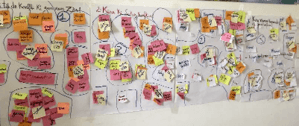Youth-led community-based research: working in and on conflict in Haiti
Blog Post by Reina C Neufeldt
The idea that research can be practical, involve community members as knowledge co-creators, and help a community transform its conflict sounds fantastic. As someone who has studied, worked on and taught conflict resolution and peacebuilding for many years, it sounds ideal – there was a reason that key conflict resolution figures like Herb Kelman used action research as a model with problem-solving workshops.
Of course, things are not simple. Conflict settings are challenging places to work. There are power disparities and inequalities, people do not trust one another; there is fear, frustration, anger and despair. Further, problems within communities are tied to larger socio-economic systems and structures.
In what ways can community-based research actually be helpful on the ground in an insecure setting? This article came about because of a collaboration on community-based research as part of a larger youth-centered peacebuilding and security initiative in Haiti. The initiative involved partners from Canada supporting a non-governmental organization and youth in four communities to engage in action research, under the umbrella of community-based research, as part of the 26-month project. My coauthor, Rich Janzen, brought his expertise in community-based research to the project.
What we did and what we learned from it are in the article. Drawing on our experiences, we offer a number of practical ways to work through problems of distrust and internal community divisions by actively adapting the action research to the local community context.
We hope our findings are helpful for others interested in working in this area and are terrifically thankful to the youth researchers, community members and our colleagues in Haiti who owned the work.
We invite you to learn more about this experience by reading our article HERE. Free 15-day access is available for this article beginning 28 September.
After you’ve had a chance to read this piece, please share your thoughts, ideas, or experiences with our community in the comments section so we can continue this discussion!
- Making Public Deliberations Inclusive with Mixed Methods AR - October 26, 2020
- Participatory action research with Aboriginal Elders: Ngulluk Koolunga Ngulluk Koort project - October 12, 2020
- Bringing the relational self to ART: Interview with Dr. Yvonne Skipper - October 1, 2020

